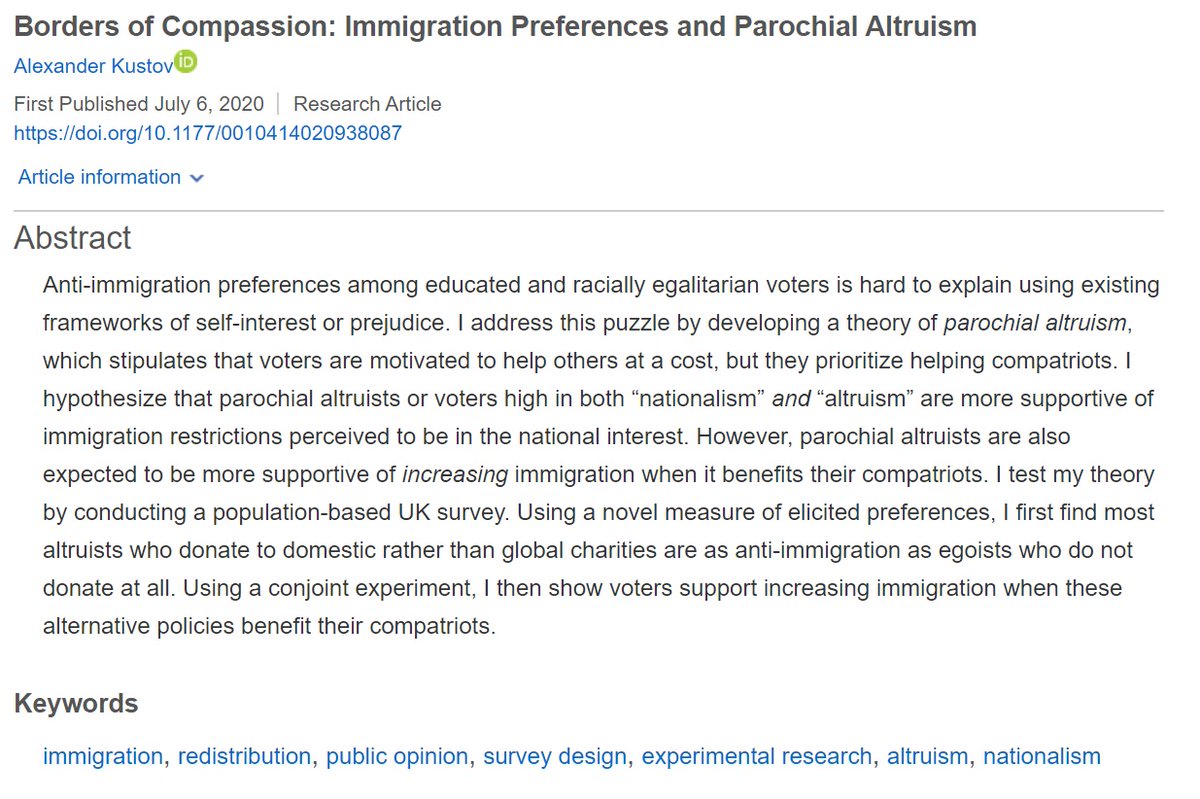I'm beyond thrilled to see a part of my dissertation and the ongoing book project examining under what conditions most people would accept more open immigration policies finally out in Comparative Political Studies https://doi.org/10.1177/0010414020938087
My research shows many people are "altruistic nationalists": they are willing to incur a cost to benefit others, but they prioritize helping compatriots. Voters thus tend to favor harsh immigration restrictions because they perceive them as necessary to secure national well-being
Since human mobility can be as much an opportunity as a threat, however, I also show these widespread nationalistic sentiments that currently make people wary of immigration can lead them to embrace it under alternative policies that more straightforwardly benefit their country
It feels eerie to see this paper out when the current administration is attempting to stop virtually all US immigration in the name of "America First." But it's important to separate (often empty & destructive) nationalist rhetoric from policies that demonstrably benefit citizens
The problem with many "nationalistic" politicians and organizations who oppose immigration is exactly that, quite ironically, they often want to reduce immigration as a goal in itself rather than figuring out what more or less restrictive policies are better for their country
As my research optimistically suggests, adopting more evidence-based regulations to advance national interest would not just be good policy—it could also be good politics since surprisingly few voters on both the left and the right dislike immigration for its own sake
For more information about my book project and the ungated version of the paper, check out my new website: https://alexanderkustov.org/book/
Although my paper focuses on immigration politics, parochial altruism is pervasive and consequential all throughout society. In this respect, the ultimate question is what institutions can help us all to reap its benefits but also minimize its global costs https://twitter.com/Cullen_OK/status/1279510628328071168?s=20
While my research here does not aim to propose/endorse any particular policy solution since what's best is often context-dependent, I should say I've been consistently impressed by @CGDev's initiatives (incl. work by @RebekahL_Smith/ @m_clem/ @Cindy_Y_Huang) https://twitter.com/RebekahL_Smith/status/1276593308052213761?s=20
I just noticed that the publisher's version of the paper does not include the online appendix yet. Here is the full ungated version with all the relevant supplemental materials: https://bit.ly/3iT9Pxw
May also be of interest to scholars outside of political science: @paulbloomatyale, @profcikara, @NAChristakis, @JonHaidt, @PeterSinger, @glenweyl, @BrankoMilan, @_alice_evans #EconTwitter #SocSciResearch

 Read on Twitter
Read on Twitter


